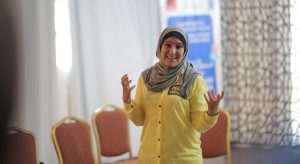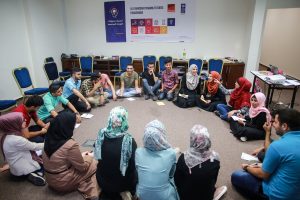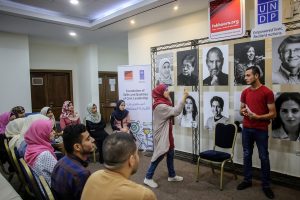Creating a journey that improves skills and instils hope was the passion that drove me when I worked for Al Fakhoora Dynamic Futures Programme in Gaza; a journey that I have been on for over three years now, as I have been working with 630 students as a mentor in the Inspirational Leadership Development Programme and in various other educational activities. Mentoring students in a strategic program that aims to create cadres of young leaders for civic engagement is a unique and rewarding life experience.
In 2009, Al Fakhoora Dynamic Futures co-funded by Education Above All Foundation and Islamic Development Bank, started as one of the flagship education programs in Gaza. The program moved beyond providing access to higher education and began to offer a comprehensive package of services to help bridge gaps and teach missing yet important study, life, and leadership skills to students who are currently enrolled in higher education. While in its first phase, Dynamic Futures aided 340 students in their transition from high school to college, the second phase engages 630 students in a learning journey that strives to crystalize their personalities to become change makers who can contribute positively to the development of their communities.
Working as a key trainer in the Civic Inspirational Leadership Programme, I facilitated the Foundation of Civic Leadership Skills and Qualities, defining the key characteristics of a competent leader and providing situational experiences and specific examples of civic leaders past and present through mini case studies. Skills-development methods varied from social emotional learning to what we term the seven survival skills,*1 focusing on student learning outcomes pertinent to a contemporary civic leader in today’s world of a globalized and integrated economy. Along with other trainers and co-trainers, I taught students the basics of effective communication, social media, time management, soft skills, and self-confidence.
In early 2018, I worked with UNDP as a consultant to design the “Art of Dialogue and Facilitation” that marks this second phase of the Al Fakhoora Civic Inspirational Leadership Programme. This comprehensive, multistage program aims to empower students to become motivated civic leaders with the ability to engage productively in the rebuilding of their societies and to provide leadership within and outside their own communities.

Working with passion was my driving force. Even though I had a curriculum, I also added my own various techniques. I approached situations from the students’ perspectives to help me see things through their eyes. Understanding the students’ experiences within their diverse communities is significant to creating common grounds. I used a participatory approach and learning by doing to encourage students to discover the skills by themselves and actualize their learning. Using an interactive approach with interesting learning games in the context of Art of Dialogue and Facilitation training aims to provide students with effective skills in meaningful dialogue and discussions.
The training program used techniques such as facilitation, storytelling, lobbying, the art of advanced communication skills in various types of scenarios that include academic, social, emotional, traumatic, and stressful situations to teach students how to remain focused, cool, calm, and collected. Students learned to be nonpartisan facilitators, manage difficult conversations, and promote better understanding between different individuals in social, cultural, political, ethnicity-related, and religious discussions.

The program’s curriculum design is based on international standards that include Outcome Based Education (OBE) and the Bologna Framework,*2 while at the same time it is contextualized with the need of specific regions such as Gaza, Turkey, Syria, and others. The taxonomies of Bloom*3 and Structure of Observed Learning Outcomes (SOLO)*4 were used to develop all learning outcomes. This high level of sophistication and the fact that the Inspirational Civic Leadership Programme is spread over three to four years has made it possible to take the students on a learning journey and impart knowledge, skills, and competencies to finally reach efficacy in their area of specialization.
The program is intertwined with the students’ degree program, providing them with ample time to learn, absorb, and internalize the information so that they may become effective civic leaders. As the students take these training sessions mostly during summer breaks, the program is designed not to overburden the students to the extent that their degree program suffers. At the same time, it ensures that there be no compromise in quality and no overlap of materials between the two parallel programs.
The need to heighten the values of respect for wide diversities, learning about co-existence, adaptability, and acceptance of the variety of thoughts, tolerance, neutrality, and giving safe spaces were among the learning outcomes that I have worked on with UNDP/PAPP’s Al Fakhoora Program, and the fellow trainers to achieve through the activities. It is not about training sessions. I am contributing to building competences and skills. We do not want youth to live behind doors but rather that they be up to the challenge of their communities and engage in building positive outcomes.
It was encouraging to be able to witness how students who came from marginalized remote areas of the Gaza Strip developed increasing signs of respect and gender sensitivity, overcoming their initial fears towards interacting with female mentors, gradually opening up for discussions, and showing more respect for female students and the readiness to engage in active dialogue with them. It is always rewarding to give limitlessly to such passionate students who share with us the willingness to learn.

Ahmad, Iyad, Riham, Batool … there are countless names of young people whose development and change I was able to witness. These students were able to start walking another track of life, moving into increased positivity, challenging the stereotypes, and inspiring others as well. In the dire context of daily life in Gaza, such experiences give hope and the courage to move on – never to give up, no matter what the odds!
*1 Critical thinking and problem solving, collaboration across networks and leading by influence, agility and adaptability, initiative and entrepreneurship, effective oral and written communication, accessing and analyzing information, and curiosity and imagination.
*2 This framework outlines the international agreement on the number of credit hours that generally constitute bachelor’s, master’s, and doctoral degrees.
*3 Bloom’s taxonomy organizes cognitive, affective, and sensory learning objectives in a set of three hierarchical models that classify educational learning objectives according to their levels of complexity and specificity.
iv This model outlines levels of increasing complexity to guide the teaching of academic topics.


